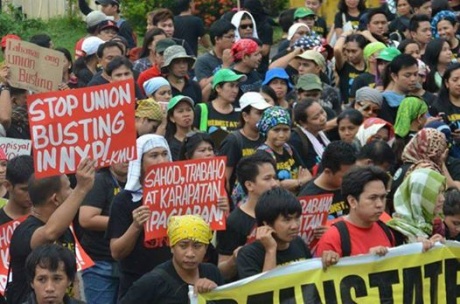
Chip producer NXP involved in multiple disputes with local trade unions
Today, as NXP’s holds its annual shareholder meeting, the GoodElectronics Networks is publishing a report about NXP’s conflicts with local trade unions in Thailand and the Filippines in 2014. NXP hides the conflicts from its shareholders in the annual report presented today, but proposes today a meeting with the local Thai union.
Update: In a conversation with SOMO and the GoodElectronics Network at the annual shareholdermeeting in Amsterdam today, NXP has offered to meet with the NXP Manufacturing Workers’ Union in Thailand to discuss the issues that were presented in a report by GoodElectronics this morning. The report is about labour disputes at two of NXP’s back-end facilities. The company says it does not recognize many of the conclusions of the report, but invites the Thai union, GoodElectronics and SOMO to discuss matters more deeply with the Thai management of NXP. GoodElectronics and SOMO welcome this step and are looking forward to the discussion.
The year was characterized by major labour disputes, strikes and international solidarity actions. These recent developments could end up causing disruptions to production, putting a strain on NXP’s current business achievements. They also risk the goodwill of high-profile customers such as Apple who are sensitive for labour rights violations in their supply chain.
Irene Schipper – researcher at SOMO: “NXP claims it has good relations with all its employees, but actually the company hides some major conflicts from its shareholders. We advise NXP to re-evaluate its employee relations and invest in good relations with local trade unions”.
Union members dismissed in the Philippines
For the NXP union in the Philippines, problems started on May 2014, when a group of workers was pulled out of production and fired for encouraging a so-called illegitimate strike. As the strike happened during a public holiday where workers are not obliged to report for work, the termination was actually a clear case of union-busting: all 24 dismissed workers were union officers and member of the collective bargaining negotiation panel.
Harassment of union members in Thailand
Negotiations with the Thai NXP Manufacturing Workers’ Union have been ongoing since September 2012. One of the issues is the new 12-hour shift schedule, which has replaced the 8-hour working days. A call for action by the union led to a lock-out of the union members and officials. The harassment of the union is still ongoing today and a new collective bargaining agreement was recently put on hold.
Sakoldet Silapong of GoodElectronics Thailand: “NXP claims the new work schedule is in compliance with Thai labour laws, but the company should abide by international labour standards like the ILO core conventions.”
Irene Schipper: “NXP is currently in a good position to profit optimally from upcoming developments, like the mobile payments market. The company puts the business relations with their biggest brand name customers Apple and Samsung at risk if it does not acknowledge and address the disturbed industrial relations.”
The report ‘Unable to connect – Research on labour disputes at NXP’ was written by SOMO and published by the GoodElectronics Network(opens in new window) .
Summary-Unable-to-connect.pdf (2064 downloads )
Do you need more information?
-

Irene Schipper
Senior Researcher
Partners
Related news
-
 The hidden human costs linked to global supply chains in ChinaPosted in category:News
The hidden human costs linked to global supply chains in ChinaPosted in category:News Joshua RosenzweigPublished on:
Joshua RosenzweigPublished on: -
 Major brands sourcing from China lack public policies on responsible exitPosted in category:News
Major brands sourcing from China lack public policies on responsible exitPosted in category:News Joshua RosenzweigPublished on:
Joshua RosenzweigPublished on: -


